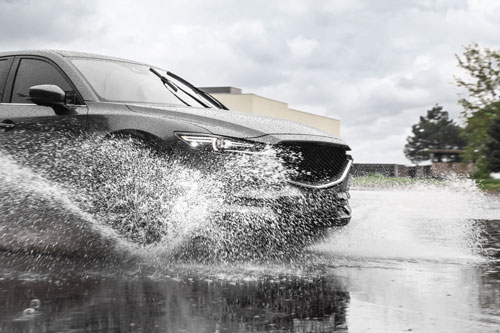One of the most dangerous driving situations on Colorado’s roads can occur with little or no warning. It can happen in all kinds of weather, too, from a summer monsoon to a light fall drizzle, from a frigid winter storm to a sunny spring day with lots of snowmelt.
It’s called hydroplaning, and it can cause your car to skid or spin out of control, endangering those in your vehicle and others around you. Here’s what you need to know to avoid this all-too-common road hazard, and what actions to take if it happens to you.
WHAT IS HYDROPLANING?
Hydroplaning occurs when your tires start sliding along a wet surface rather than riding on the road as intended. The tire’s treads are designed to channel water away from the tire, so that the tire can maintain contact with the road surface at all times. But if a film of water interferes with that contact, the result can be a loss of traction, followed by diminished control over steering and braking abilities.
The phenomenon of hydroplaning (or “aquaplaning”) is usually associated with heavy rain or driving through a pool of standing water, like you would find on a flooded road. But hydroplaning can occur even on a road that’s only damp. In fact, many hydroplaning accidents occur in the first few minutes of a light rain, when the moisture mixes with oil and dirt on the road surface, making for exceptionally slippery conditions. The situation becomes even more dangerous because many drivers underestimate the peril; they may be cautious in blizzard conditions involving poor visibility and ice, but they fail to take similar precautions on roads that seem barely wet. Yet a slick road can be every bit as dangerous as an icy one.
TIPS FOR PREVENTING HYDROPLANING
- Slow down. The best way to protect yourself from hydroplaning is to be aware of changing weather conditions and adjust your speed accordingly — just as you would for fog, ice, or slush. The faster you drive, the more difficult it is for your tires to maintain a steady grip on the road, and the less reaction time you have if your vehicle starts to lose traction. Aggressive passing is discouraged in wet weather, since sudden acceleration can lead to loss of control.
- Check your tires. Before embarking on road trips, especially if they involve mountain driving, make sure your tires are properly inflated, balanced, and have sufficient tread. If you find yourself on wet roads a lot, you should consider purchasing tires specifically designed for rainy conditions.
- Avoid the deep water. Try to stay away from puddles and outer lanes, where water may accumulate. If possible, follow in the tracks of cars ahead of you that seem to be navigating correctly.
- No cruise control. Never use cruise control in wet conditions, as a sudden burst of acceleration could cause a loss of traction.
- Don’t ride the brakes. Most cars these days have some form of built-in traction control, but it shouldn’t be your only means of defense against hydroplaning. Hard braking can put you in a sudden spin that even anti-lock brakes and traction control can’t correct. Better to use the brake sparingly, use a lower gear to help keep your speed down (especially on a steep descent), and try not to make any sharp turns.
RECOVERING FROM HYDROPLANING
If, despite your best efforts, you find yourself in a hydroplaning situation, the first thing to do is remain calm. Don’t panic and slam on the brakes or the accelerator; instead, some experts suggest gently steering in the direction the car is skidding, so as to realign the tires and regain control. If possible, look for an open area ahead that you can direct the vehicle toward so as to avoid any collisions. Once you feel the tires reconnecting with the road, you can use “soft braking” to help control the vehicle.
Losing control of your vehicle can be terrifying. But taking the proper precautions and not losing your cool can help prevent a scary situation from turning into something much worse.
THE CAR ACCIDENT LAWYERS AT FDAZAR
For more than thirty years the attorneys at Franklin D. Azar & Associates have helped thousands of injured people obtain complete and timely compensation for their losses. Our proven track record and expertise have allowed us to grow into the largest personal-injury law firm in Colorado, with offices in Denver, Aurora, Thornton, Fort Collins, Greeley, Grand Junction, Colorado Springs, and Pueblo. If you’ve been injured in a bus, car, truck, or motorcycle accident, you may be entitled to compensation. Please call the car accident attorneys at FDAzar day or night at 800-716-9032, or contact us here for a free consultation and no-obligation evaluation of your case.



